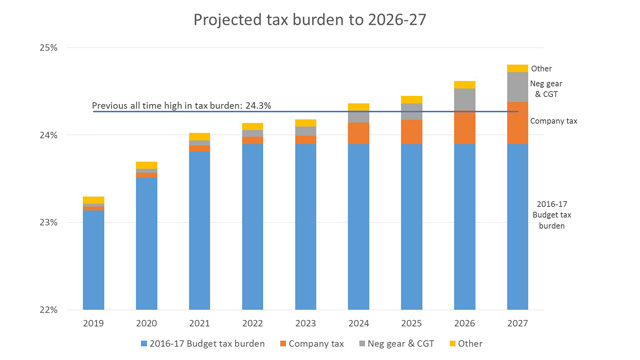Home » Commentary » Opinion » Tax burden to reach a new all-time high under ALP’s policies
· Ideas@TheCentre

 Based on estimates by the CIS, the ALP’s announced tax policies will cause the federal government’s tax burden to reach a new all-time high in eight years’ time (2023–24), and increase further in future years. In ten years’ time, the burden will be $8.9 billion above its all-time high in today’s money.
Based on estimates by the CIS, the ALP’s announced tax policies will cause the federal government’s tax burden to reach a new all-time high in eight years’ time (2023–24), and increase further in future years. In ten years’ time, the burden will be $8.9 billion above its all-time high in today’s money.
The previous record for the highest ever tax burden was set in 2004–05 and the ALP has been rightly critical of the then Coalition government for setting this record. It is therefore ironic that the ALP is set to break this record — one they strenuously opposed at the time.
The CIS estimates that the main causes of this large increase in the tax burden are the ALP’s plans to oppose the company tax cut, reduce negative gearing, and cut the CGT discount. This is shown in the graph below. The item ‘Other’ includes the proposed increase in the top marginal tax rate, tightening of multinational tax rules and several very small tax cuts.

This projected tax increase is in addition to the already sharp increases in the tax burden that will occur under either major party. The estimated increase in the burden per person is 12.7% over the next five years in real terms, with the burden set to be $29.6 billion above the historical average in 2020–21. The ALP is proposing to make this worse, with the gap to the historical average in 2026–27 set to be $46.0 billion, or $1,905 per person, in today’s money.
This is a comparison to the policies contained in the 2016–17 Budget, including the assumed cap on the tax to GDP ratio of 23.9% (a cap that will clearly be breached by the ALP’s policies).
The forecast for a record tax burden is troubling. The ALP should revert to its previous approach of committing to no increase in the total tax burden, and opposition to the tax burden reaching record levels. This is particularly important given the substantial economic costs of higher taxes and larger government, as frequently criticised by the CIS.
Tax burden to reach a new all-time high under ALP’s policies